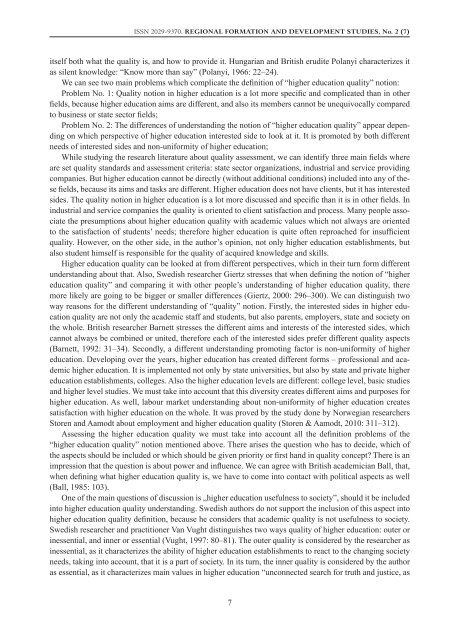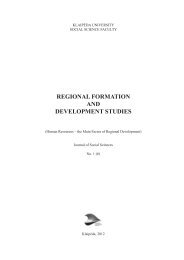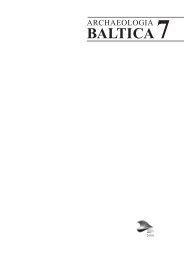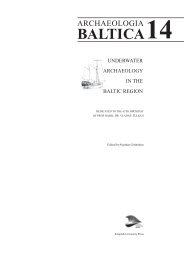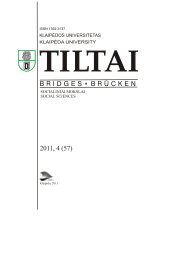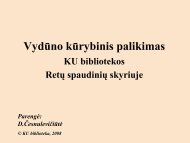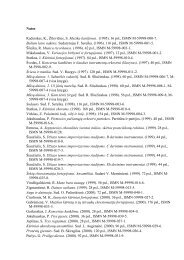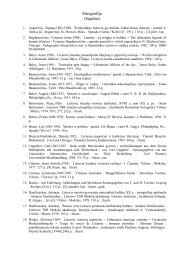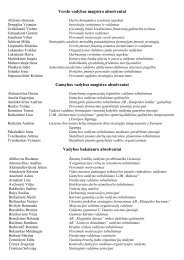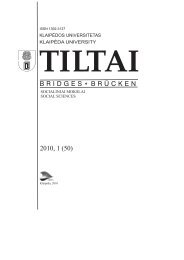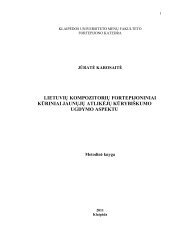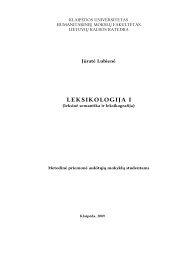regional formation and development studies - KlaipÄdos universitetas
regional formation and development studies - KlaipÄdos universitetas
regional formation and development studies - KlaipÄdos universitetas
Create successful ePaper yourself
Turn your PDF publications into a flip-book with our unique Google optimized e-Paper software.
ISSN 2029-9370. Regional Formation <strong>and</strong> Development Studies, No. 2 (7)<br />
itself both what the quality is, <strong>and</strong> how to provide it. Hungarian <strong>and</strong> British erudite Polanyi characterizes it<br />
as silent knowledge: “Know more than say” (Polanyi, 1966: 22–24).<br />
We can see two main problems which complicate the definition of “higher education quality” notion:<br />
Problem No. 1: Quality notion in higher education is a lot more specific <strong>and</strong> complicated than in other<br />
fields, because higher education aims are different, <strong>and</strong> also its members cannot be unequivocally compared<br />
to business or state sector fields;<br />
Problem No. 2: The differences of underst<strong>and</strong>ing the notion of “higher education quality” appear depending<br />
on which perspective of higher education interested side to look at it. It is promoted by both different<br />
needs of interested sides <strong>and</strong> non-uniformity of higher education;<br />
While studying the research literature about quality assessment, we can identify three main fields where<br />
are set quality st<strong>and</strong>ards <strong>and</strong> assessment criteria: state sector organizations, industrial <strong>and</strong> service providing<br />
companies. But higher education cannot be directly (without additional conditions) included into any of these<br />
fields, because its aims <strong>and</strong> tasks are different. Higher education does not have clients, but it has interested<br />
sides. The quality notion in higher education is a lot more discussed <strong>and</strong> specific than it is in other fields. In<br />
industrial <strong>and</strong> service companies the quality is oriented to client satisfaction <strong>and</strong> process. Many people associate<br />
the presumptions about higher education quality with academic values which not always are oriented<br />
to the satisfaction of students’ needs; therefore higher education is quite often reproached for insufficient<br />
quality. However, on the other side, in the author’s opinion, not only higher education establishments, but<br />
also student himself is responsible for the quality of acquired knowledge <strong>and</strong> skills.<br />
Higher education quality can be looked at from different perspectives, which in their turn form different<br />
underst<strong>and</strong>ing about that. Also, Swedish researcher Giertz stresses that when defining the notion of “higher<br />
education quality” <strong>and</strong> comparing it with other people’s underst<strong>and</strong>ing of higher education quality, there<br />
more likely are going to be bigger or smaller differences (Giertz, 2000: 296–300). We can distinguish two<br />
way reasons for the different underst<strong>and</strong>ing of “quality” notion. Firstly, the interested sides in higher education<br />
quality are not only the academic staff <strong>and</strong> students, but also parents, employers, state <strong>and</strong> society on<br />
the whole. British researcher Barnett stresses the different aims <strong>and</strong> interests of the interested sides, which<br />
cannot always be combined or united, therefore each of the interested sides prefer different quality aspects<br />
(Barnett, 1992: 31–34). Secondly, a different underst<strong>and</strong>ing promoting factor is non-uniformity of higher<br />
education. Developing over the years, higher education has created different forms – professional <strong>and</strong> academic<br />
higher education. It is implemented not only by state universities, but also by state <strong>and</strong> private higher<br />
education establishments, colleges. Also the higher education levels are different: college level, basic <strong>studies</strong><br />
<strong>and</strong> higher level <strong>studies</strong>. We must take into account that this diversity creates different aims <strong>and</strong> purposes for<br />
higher education. As well, labour market underst<strong>and</strong>ing about non-uniformity of higher education creates<br />
satisfaction with higher education on the whole. It was proved by the study done by Norwegian researchers<br />
Storen <strong>and</strong> Aamodt about employment <strong>and</strong> higher education quality (Storen & Aamodt, 2010: 311–312).<br />
Assessing the higher education quality we must take into account all the definition problems of the<br />
“higher education quality” notion mentioned above. There arises the question who has to decide, which of<br />
the aspects should be included or which should be given priority or first h<strong>and</strong> in quality concept? There is an<br />
impression that the question is about power <strong>and</strong> influence. We can agree with British academician Ball, that,<br />
when defining what higher education quality is, we have to come into contact with political aspects as well<br />
(Ball, 1985: 103).<br />
One of the main questions of discussion is „higher education usefulness to society”, should it be included<br />
into higher education quality underst<strong>and</strong>ing. Swedish authors do not support the inclusion of this aspect into<br />
higher education quality definition, because he considers that academic quality is not usefulness to society.<br />
Swedish researcher <strong>and</strong> practitioner Van Vught distinguishes two ways quality of higher education: outer or<br />
inessential, <strong>and</strong> inner or essential (Vught, 1997: 80–81). The outer quality is considered by the researcher as<br />
inessential, as it characterizes the ability of higher education establishments to react to the changing society<br />
needs, taking into account, that it is a part of society. In its turn, the inner quality is considered by the author<br />
as essential, as it characterizes main values in higher education “unconnected search for truth <strong>and</strong> justice, as<br />
7


